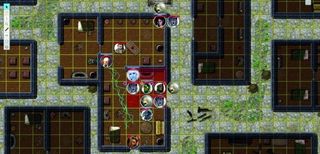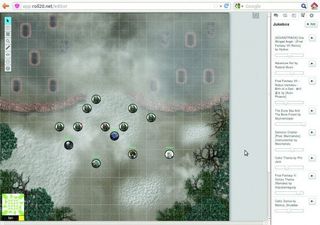How Roll 20 brings the spirit of D&D to PC

“Okay guys. That was pretty much the loudest thing that's ever happened. Every guard on the floor hears the crash. Roll for initiative.”
“Everybody get into the corridor!” cries the Warlord. Action stations! I rush into the passage and form a vanguard with the robot as Killick's hired muscle charge in from all directions. Miles, the precision musician with a wit that can crit, brings the snark with the aid of a Shakespearean insult generator. “Thou gorbellied motley-minded canker-blossom!” the gnome screams. A guard reels, clutching his ears.
That's when it clicks. Our cover is blown. We're outnumbered and fighting for our lives. We could have stuck to the plan and nabbed the ledger quietly – but no. Sometimes it's just too funny not to kick someone through a window. In Dota 2, endangering your team is a form of betrayal through incompetence. In D&D it's a dramatic catalyst.
I understand what I've been getting wrong about D&D all this time. I've been playing to win, but I had the win-state all wrong. Victory isn't about slaying a dragon or levelling up. These are just bumps on the road that measure the passage of time. You're winning when you crack a joke that leaves party members in stitches, or come up with an ingenious solution to a puzzle, or break the DM's mind with a course of action that they could never have anticipated.

When everything falls into place, a group can forge a series of dice rolls into a collaborative improvised scenario, and a story is born. The unease I felt when I started playing wasn't confusion – it was performance anxiety.
This changes everything. The baubles that I'm so used to fighting for to progress in videogame RPGs take on a different significance. Sure, my fiery Sun Blade lets me hit a little harder in combat, but really it's a souvenir that reminds me of the time we completed a series of elemental trials and our Warlord accidentally ingested a vat of hallucinogens.
Many videogame systems owe a debt to D&D's mathematical backbone, but so few apply it in the spirit the original RPG intended. As much as I love them, I feel like those influential early RPGs misrepresented the systems that inspired them. D&D's dice rolls are designed to put any idea to the test. Its rules provide a bedrock for player autonomy. Baldur's Gate carried the official license, but games like EVE Online, Wurm and Minecraft feel like D&D's true spiritual successors.
The biggest gaming news, reviews and hardware deals
Keep up to date with the most important stories and the best deals, as picked by the PC Gamer team.
The rush of goons fares poorly in a confined space with an angry fox and a cybernetic behemoth. We escape. Lord Killick is nowhere to be found, but his personal army lies in tatters and we have the ledger. We're safe.
Now we face the hardest question of all. “What does the party want to do next?”
We consider remaining in Sigil to start a shipping business with our stolen space-boat. We could offer our services as mercenaries and build up a power base in the criminal underworld. Or we could take the boat and jet off to the far reaches of the known universe. We return to the boat. Someone hums the Star Trek theme. My fox takes his position in the crow's nest and I imagine how many more levers there are out there waiting. I make a silent pact to pull all of them. Every last one.
Part of the UK team, Tom was with PC Gamer at the very beginning of the website's launch—first as a news writer, and then as online editor until his departure in 2020. His specialties are strategy games, action RPGs, hack ‘n slash games, digital card games… basically anything that he can fit on a hard drive. His final boss form is Deckard Cain.
Most Popular


